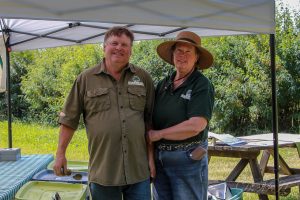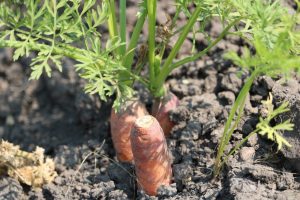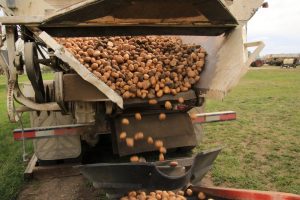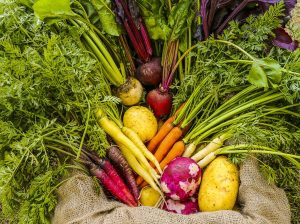Favourite Gluten-Free Items Available at Spud May National Celiac Awareness Month, but every day Spud…
By Ryleigh Stangness
How sweet it is
Many seasoned farmers will tell you they once planted crops and hoped for the best. But today’s farmers are increasingly incorporating advanced scientific practices to further their success and grow high-quality products for their clients.
“A key ingredient for us is irrigation, without it there is no way we could grow in this desert climate, our vegetable farm would just be a range with cattle,” explains Rosemary Wotske, owner of Poplar Bluff Organic farm. “We can’t count on rain to grow our potatoes or carrots.”
Wotske has a Biology degree majoring in Physiology and Biochemistry, and a Master of Science in Plant Genetics. She thoroughly understands irrigation systems and has continually refined her farm’s practices since the 80’s. It is what makes the rainbow of organic food that adorns so many local dinner plates possible.
Located just east of Calgary, Poplar Bluff Organics are known for their cool-season root vegetables, snappy parsnips, hearty potatoes and sweet, purple-stained beets.
In this area, high up in the Palliser Triangle, they are used to hazy hot days and gusting winds. Irrigation often helps soften the toll of the merciless weather and keep crops from drying out until they reach harvest.
At night, the triangle takes a dip in temperature which helps the vegetables retain the sugar they create from the sun. Through an enzymatic process, the vegetables make enough sugar to share with their microbiome neighbours, feed themselves and still have enough leftover to deliver their signature sweetness.

How does irrigation factor in?
Irrigation is a key factor in the crop cycle to improve the farm’s yield and also the quality of the crop. By measuring the moisture in the soil a few feet down, Rosemary’s team determines how much moisture the roots of a plant are soaking up even if the first few feet down seem dry.
Optimal irrigation is a delicate process. Too much water early on can lead to major root growth but not vertical crop growth, with plants expending too much energy growing down instead of up. And on the contrary, too much water too late can lay down a crop, causing damage and loss. If it’s not used at just the right time, they can miss their opportunity for peak growth.

How does irrigation help the farm give back to the earth?
Poplar Bluff believes in growing rich organic vegetables that “don’t cost the earth.” This means they want to produce crops that leave the world better than they found it. They constantly look for ways to live in harmony with the fauna and soil around them.
There is a symbiotic relationship with the fungi that thrive on their farm, due to the moist soil. When they plant potatoes, they add a dash of molasses in the row. The fungi reaches out and uses the sugar and offers minerals to the plants they may not otherwise be able to reach. By the time potatoes sprout roots and reach out to the fungi, it is already waiting to give back, establishing a mutual trading relationship.
“Without irrigation provided by the Western Irrigation District, there wouldn’t be enough moisture to support this activity,” Wotske explains. The soil microbiome becomes dormant when there isn’t enough moisture to support their growth.
Put simply, the greater the quality of the soil and quantity of nutrients and minerals, the more sugar the vegetables can make which allows them to thrive and interact with the sophisticated ecosystems around them.

How you can help
By choosing local responsible growers and distributors like Poplar Bluff Organics, you support their mission to grow more healthy, nutritious food while supporting the natural regenerative cycles of the earth’s soil and ecosystems.




